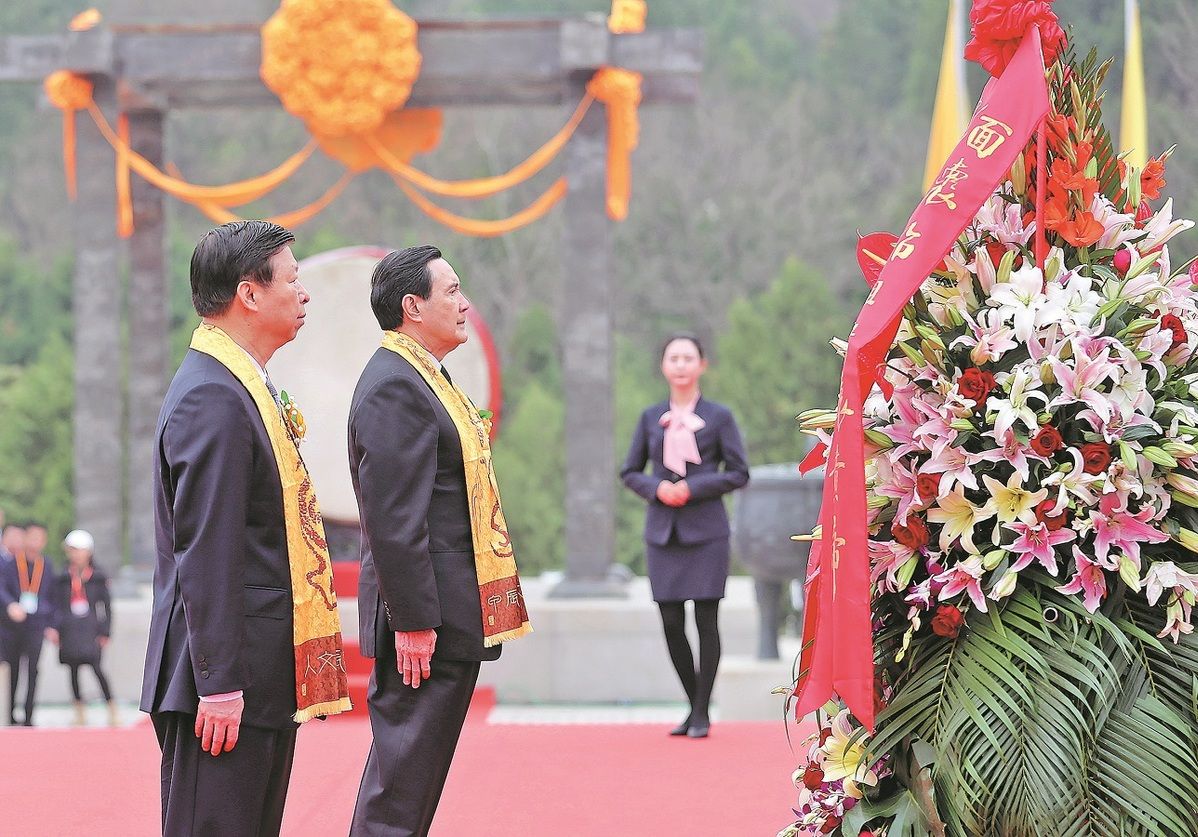source: editor:Zhang Wenni

Song Tao (left), head of both the Taiwan Work Office of the Communist Party of China Central Committee and the Taiwan Affairs Office of the State Council, and Ma Ying-jeou, former chairman of the Chinese Kuomintang party, attend a ceremony paying tribute to Chinese ancestor Emperor Huangdi in Huangling, Shaanxi province, on Thursday. MU JIALIANG/FOR CHINA DAILY
Ma Ying-jeou, former chairman of the Chinese Kuomintang party, called on Taiwan youths to remember the roots of Chinese culture and the Chinese nation as he led a Taiwan youth group to attend a ceremony paying tribute to Chinese ancestor Emperor Huangdi in Huangling, Shaanxi province, on Thursday, or Tomb-Sweeping Day.
Emperor Huangdi, or the Yellow Emperor, widely regarded as the progenitor of the Chinese nation, has been worshipped since the Han Dynasty (206 BC-AD 220).
Huangling county is considered the location of Huangdi's tomb, and in recent years, a ceremony to worship Huangdi has been held there every Tomb-Sweeping Day, or Qingming Festival.
During his eight years as leader of Taiwan island, Ma held six ceremonies in Taipei to worship Huangdi. Thursday's worship ceremony marks his first time attending such an event on the Chinese mainland.
After completing the worship ceremony in Huangling, Ma delivered a speech. "Emperor Huangdi is the common ancestor of the Chinese nation," Ma said. "Today, being able to bring our young people from Taiwan to Shaanxi to personally worship at Huangling, I feel it is of significant meaning."
Most Taiwan people have a very firm belief in Chinese culture and the identity of the Chinese nation, he said.
"I have always believed that honoring ancestors and remembering their origins are important foundations for the Chinese nation establishing excellent traditions lasting for thousands of years," said the former KMT leader.
More importantly, honoring ancestors and handing down fine traditions across generations are core values of Chinese culture, and part of the virtues of people in Taiwan, he stressed.
"My visit is to express Taiwan people's respect for traditional Chinese culture and ancestor veneration, and to help more people understand the importance of national cultural heritage," Ma said.
"I also hope that our young people from Taiwan, through this rare opportunity, will further remember the roots of Chinese culture and the Chinese nation, and the pride of being descendants of Emperor Yandi and Emperor Huangdi!"
Emperor Yandi is regarded as the other progenitor of the Chinese nation.
Thursday marked the fourth day of Ma's visit to the mainland.
On Wednesday, Ma visited the Huanghuagang 72 Martyrs' Cemetery in Guangzhou, Guangdong province.
He expressed condolences that day for those affected by the strong earthquake hitting Taiwan early that morning: "I hope everyone is safe and well."